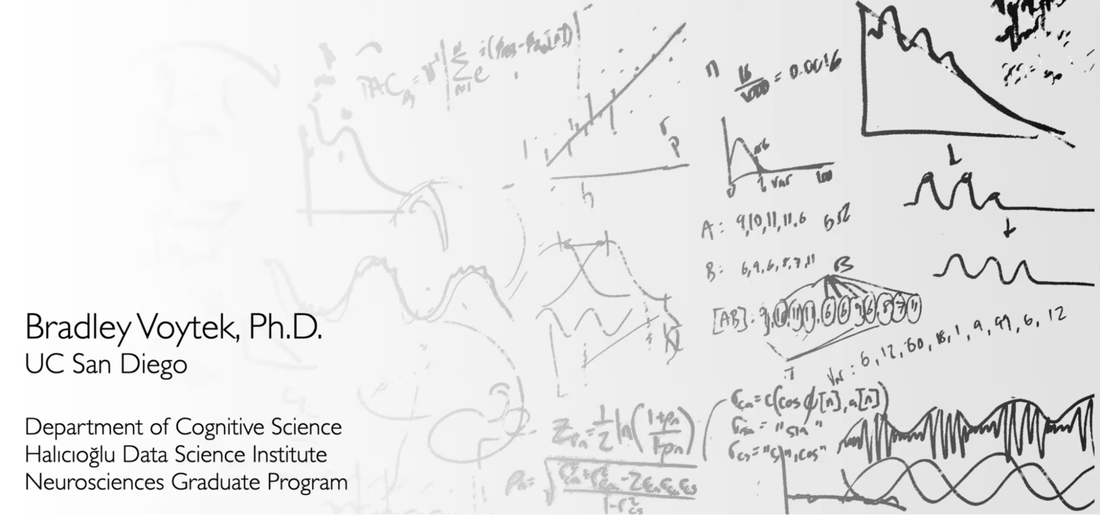Naomi GaggiScientific writing workshop by Bradley Voytek, hosted by the SP-SIG On April 27th, 2023, OHBM’s Student–Postdoc Special Interest Group hosted a workshop on best practices in scientific writing with Dr. Bradley Voytek. Dr. Voytek is a Professor in the Department of Cognitive Science, the Halıcıoğlu Data Science Institute, and the Neurosciences Graduate Program at UC San Diego. He is a strong advocate for science communication and outreach, and he has engaged with audiences as diverse as Scientific American, National Public Radio, and San Diego Comic-Con. The event covered a range of topics related to scientific writing, the different forms of scientific outreach, and ways to frame our scientific work for communicating with the public. Overall, there were three main takeaways from his talk: 1) practice communicating your science and engaging different audiences, 2) embrace your journey, and 3) find your niche, have fun with your work, and dive right in! Scientific Communication and Engagement. Dr. Voytek engaged the audience by sharing his journey with scientific writing and outreach. His first piece of advice was that the audience matters and you should tailor your message to the values of the listener. With his experience writing on topics as diverse as data science to zombie brains, Dr Voytek underscored that different audiences will approach neuroscience findings from their own unique vantage points. Understanding the nuances between presenting your science to different audiences and under different scenarios is key—for instance, how you would describe your work to an aunt at a family dinner, compared to how you’d describe it to a fellow scientist at a conference would be quite different (provided your aunt is not a neuroscientist). Neuroscience holds particular public power, fascinating many, thus being able to talk about your science clearly and effectively and in various settings is very important. A good way to practice this is by creating “elevator pitches” for different scenarios. This can help with longer versions of these pitches and is good practice for tailoring your scientific message. Embrace your journey. Dr. Voytek discussed his personal experiences with interviews and writing scientific pieces in newspapers and magazines. He also talked about his own academic journey. After receiving his PhD at UC Berkeley, he joined Uber as their first data scientist where he helped build their data science team. His current research focuses on both neuroscience and data science. He combines large-scale data science and machine learning to study how brain regions communicate with one another, and how that communication changes with aging and disease. He stressed the importance of finding your niche and that you continue to gain experience over time. It can be a very slow process, but “just because you hit a roadblock doesn’t mean you should give up”. Along any successful journey, there are failures, however, these are not often discussed; to draw attention to setbacks, and how to deal with them, Dr. Voytek suggests reading this Nature article titled CV of failures. He said that it is a privilege to communicate the honest journey of your work and experiences that were part of his path to success, but felt like such a failure at the time. He continued by sharing that people may be impacted by your honesty about your scientific journey, and that feedback from those individuals can be extremely rewarding and motivating in your future journey. He recommended two support articles regarding the importance of scientific communication and how it may provide support to students who may not have the qualities that are easily showcased on exams and interviews [1,2]. From this workshop, it was very clear that being open about your journey is extremely rewarding and can help individuals at any career level. Find your niche, have fun with your work and dive right into it! Having fun with your work and telling stories is important in science. A fun project that turned into a huge success was Dr. Voytek’s book, co-authored with Dr. Timothy Verstynen, "Do Zombies Dream of Undead Sheep?", which also turned into a poster presentation and even a TEDEd talk. He explained the functional localization of the brain using zombie behaviors as examples. Through this medium, he was able to teach neuroscience in an accurate but publicly accessible way using pop culture’s perennial fascination with zombies. He suggested another way to demystify complex neuroscience ideas is through social media. This leads to a cycle of communication and outreach of new ideas, demystification, exposure and networking, and then more communication. In more formal communications of your science (e.g., manuscripts), Dr. Voytek suggested this resource as simple rules for structuring papers. No matter the context in which you are communicating your science, he suggested that a scientist should: 1) find your voice based on your personal journey, 2) find a niche that sets you apart, and 3) dive right in. There are so many different platforms to communicate your science and you should take advantage of your skills. Although there can be some negative connotations in being involved in public communication, education, and outreach, such as taking time away from your lab work, being involved in different types of scientific outreach can actually enhance your success by improving your communication skills and public engagement. Overall, Dr. Voytek’s talk was fantastic and it was packed with tons of information and resources! If you missed the workshop, please check out the video on the OHBM SP-SIG Youtube channel. Edited by: Alexandra Samson & ComCom team
0 Comments
Your comment will be posted after it is approved.
Leave a Reply. |
BLOG HOME
Archives
January 2024
|

 RSS Feed
RSS Feed